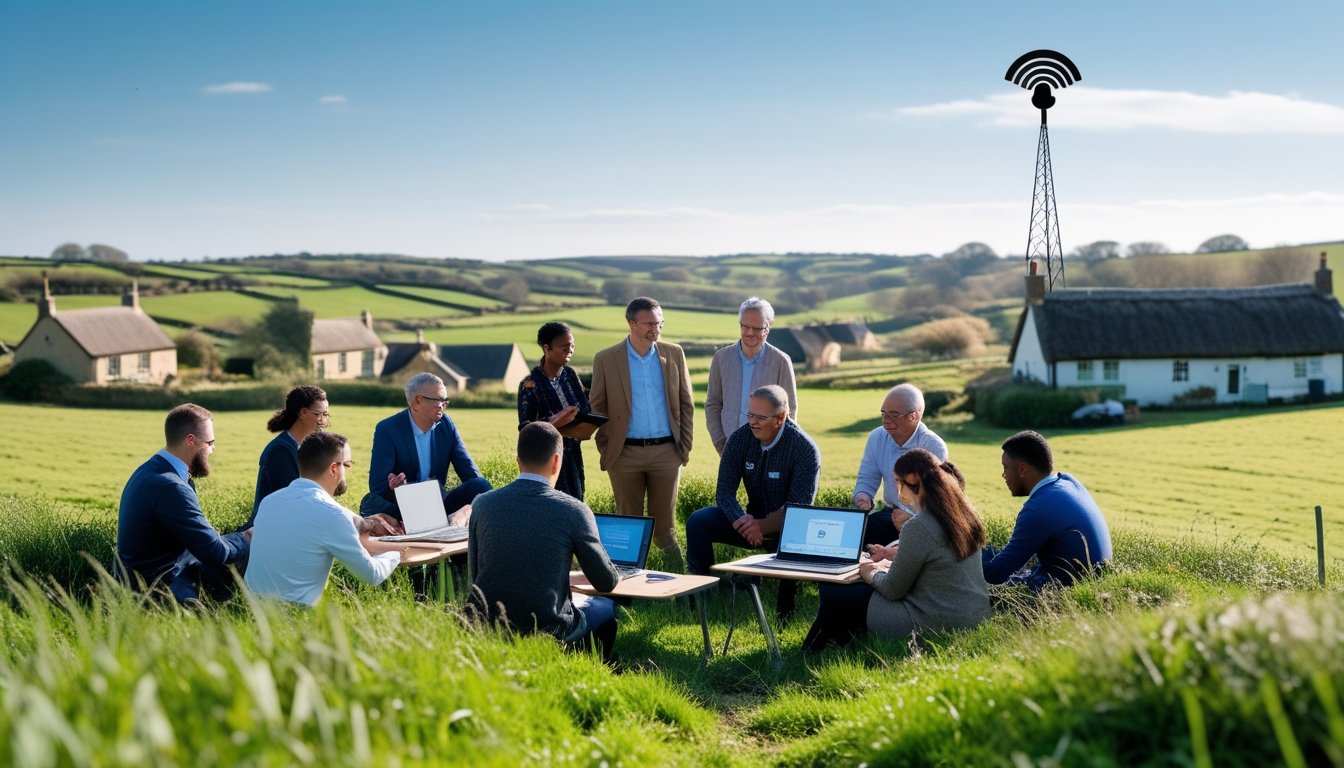Late updated: 27 Aug 2025 09:08
Written by: Oliver Bennett
Innovative Digital Skills For UK Rural Entrepreneurs: Empowering Growth and Sustainability
Enhancing digital skills amongst UK rural entrepreneurs is essential for driving growth, innovation, and prosperity in these communities. As we expand our digital horizons, we open up new opportunities for business models and revenue streams, particularly by harnessing technologies like AI. Empowering rural entrepreneurs with digital skills not only boosts their ventures but also contributes significantly to the broader economic development of the UK.

Many rural areas face challenges with digital infrastructure and connectivity, which can impede progress. Addressing these issues is crucial to ensure that technological advancements reach every corner of the nation. By bridging the digital divide, we can unlock the full potential of rural businesses and support their sustainable growth.
In this blog post, we'll explore the innovative digital skills that are transforming rural entrepreneurship in the UK. We aim to provide insights and practical advice that will inspire and equip entrepreneurs to thrive in the digital economy.
Key Takeaways
- Empowering rural entrepreneurs with digital skills boosts business and economic growth.
- Bridging digital gaps can lead to sustainable development in rural areas.
- Innovative digital strategies drive transformation and opportunities.
Innovative Digital Skills Empowering Rural Entrepreneurs

In the United Kingdom, rural entrepreneurs are increasingly harnessing innovative digital skills to overcome unique challenges and drive economic growth. Key areas of focus include customised training, the integration of artificial intelligence, and leveraging the Internet of Things (IoT) technologies.
Tailored Digital Skills Training for Rural Needs
Rural entrepreneurs often face distinct challenges, making tailored digital skills training essential. Customised programmes address specific regional needs, focusing on skill gaps unique to rural areas. For example, digital marketing, e-commerce, and efficient use of online platforms are crucial for expanding market reach. Training initiatives are often delivered through local workshops, providing hands-on learning experiences that directly apply to community businesses. Additionally, partnerships with educational institutions ensure that the curriculums are up-to-date and relevant.
- Workshop focus: Practical skills
- Key skills: Digital marketing, e-commerce
- Delivery: Local workshops and online modules
These targeted efforts empower rural entrepreneurs to navigate digital landscapes effectively.
The Role of AI and Digital Technology in Business Growth
Artificial intelligence (AI) and digital technology serve as potent engines for rural business expansion. AI-powered tools streamline operations, offering real-time data analytics and insights that inform better decision-making. Chatbots and automated customer service platforms enhance communication with clients far beyond local limits. Furthermore, digital solutions like online payment systems and cloud storage enable rural businesses to compete on a global scale.
Collaborations with tech firms can provide access to cutting-edge software and solutions, further accelerating growth. These technologies help us make informed decisions, automate routine tasks, and improve customer interaction, thus fostering larger market opportunities.
Harnessing IoT and Sensor Technology for Agriculture and Beyond
IoT and sensor technology revolutionise rural sectors, primarily agriculture. Farmers benefit significantly from sensor-enabled equipment that monitors soil conditions, weather patterns, and livestock health. This technology allows for precise resource allocation, reducing waste while increasing yields. Beyond agriculture, IoT solutions enhance logistics and inventory management, streamlining operations across various industries.
- Key IoT applications: Soil sensors, weather monitors
- Benefits: Resource efficiency, improved yield
- Broader impact: Logistics and inventory management
By employing IoT, rural businesses adopt smarter, more sustainable operations, making them more competitive in both local and international markets.
Overcoming Digital Infrastructure and Connectivity Challenges in Rural England

Rural England faces unique challenges when it comes to digital infrastructure and connectivity. Innovative solutions and strategic collaborations are crucial for bridging the digital divide, boosting economic participation, and driving innovation.
Bridging the Digital Divide for Rural Communities
In rural England, digital connectivity often lags behind urban areas due to sparse infrastructure and geographic challenges. Project Gigabit and the Shared Rural Network are pivotal initiatives aimed at improving broadband access and mobile coverage. Community-driven projects, like community broadband groups, play a vital role by pooling resources to enhance local connectivity. Satellite technology also provides interim solutions where traditional infrastructure is not feasible. These measures aim to reduce the digital disparity, ensuring that rural communities can access essential digital services and opportunities.
Enhancing Digital Economy Participation
The digital economy holds immense potential for rural entrepreneurs, but connectivity issues can hinder participation. Developing digital skills is crucial for these entrepreneurs to leverage digital tools effectively. Initiatives focused on skill development can tap into the potential for remote work, particularly in sectors like creative industries, freelance services, and small-scale e-commerce. By harnessing online platforms and digital marketplaces, rural businesses can overcome geographic limitations, connecting with broader markets. This requires ongoing training and support to ensure that digital knowledge is continually updated and accessible to all.
Collaborative Initiatives Driving Rural Innovation
Successful enhancement of digital infrastructure in rural regions relies on collaboration. Public-private partnerships are essential for funding and implementing large-scale connectivity projects. Government and local authorities can facilitate partnerships with tech companies and community groups to utilise innovative technologies. Collaboration not only expedites infrastructure development but also nurtures innovation. For instance, pilot projects utilising 5G technology can serve as a testing ground for scalable solutions, fostering entrepreneurial innovation within rural areas. It's through these concerted efforts that rural regions can fully realise their digital potential.
Frequently Asked Questions

Our exploration into innovative digital skills for rural UK entrepreneurs has highlighted key areas of importance. This includes the essential skills required, strategies to tackle business obstacles using technology, and funding avenues to enhance digital proficiency.
What are the essential digital skills needed for entrepreneurs in rural UK areas?
Entrepreneurs in rural UK areas can greatly benefit from mastering digital marketing, web development, and e-commerce platforms. Social media management and data analytics are crucial for understanding customer behaviour and optimising business strategies. Familiarity with cloud-based tools can streamline operations and improve collaboration.
How can rural UK entrepreneurs leverage technology to overcome business challenges?
Technology offers myriad solutions to common rural business challenges. Improving connectivity through reliable internet access is critical. Entrepreneurs can use online tools to expand market reach, while digital communication platforms facilitate customer engagement and remote collaboration. E-commerce enables businesses to transcend geographical limitations.
What funding opportunities are available for rural entrepreneurs seeking to improve digital skills?
Several government grants and local initiatives support the digital skill development of rural entrepreneurs. Programmes offered by Innovate UK and the Department for Environment, Food & Rural Affairs (DEFRA) provide financial aid. Additionally, certain private partnerships and NGOs offer funding specifically tailored to enhance digital proficiency in rural ventures.
What are the best practices for integrating digital technologies into a rural business?
Integrating digital technologies successfully requires a strategic approach. Entrepreneurs should start small, testing tools that promise the most immediate benefits. Continuous learning and adaptation are important, as is seeking mentorship or collaboration for complex technology implementations. Lastly, regularly monitoring performance ensures the digital tools adopted meet business objectives.
How can digital skills contribute to the sustainability and growth of rural enterprises in the UK?
Digital skills open up new markets and improve customer engagement, contributing significantly to rural business sustainability and growth. By adopting data-driven decision-making, businesses can optimise resource use and enhance productivity. Additionally, digital platforms provide an avenue to showcase local products on a global scale, driving sales and economic development.
What role do local governments play in supporting digital skill development for rural entrepreneurs?
Local governments play a pivotal role by providing infrastructure, offering training programmes, and partnering with private sectors to fund digital initiatives. They also support community-based projects that enhance internet connectivity and digital literacy. By creating ecosystems conducive to digital skill development, local authorities empower rural entrepreneurs to thrive in the digital economy.
